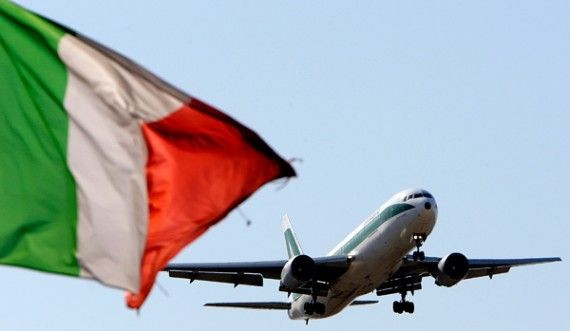Airline For Sale? Italy's Alitalia Still Unsold, Running Out Of Funding

Unions representing workers of beleaguered Alitalia airlines have asked the government to nationalize the carrier.
Alitalia has not turned a profit in 15 years. Its operations have been seriously hurt by competition from lower cost carriers and hikes in fuel prices.
Minister of Economic Development Stefano Patuanelli has already spoken in favor of nationalization.
“There have been attempts to privatize the company for 10 years, but it is of a size that the market has trouble accepting,” Patuanelli said.
Fabrizio Cuscito, leader of the Italian Transport Workers Union, welcomed the nationalization proposal, but expressed concern over how the Rome government has handled the airline since it went bankrupt in April 2017. The airline was subsequently placed into special administration after unions rejected a restructuring plan that would have laid off about 1,700 employees.
“There are almost three years of unfulfilled promises,” he said.
Indeed, since then efforts to find a buyer for the airline have failed. In early November, reports emerged that Delta Air Lines (DAL) was mulling an investment of 100 million euros ($111 million) for a 10% stake in Alitalia. German carrier Lufthansa also reportedly wanted to invest €200 million ($220.4 million) in Alitalia – but both deals fell through.
“We are open to working with other parties to develop a coherent, like-minded consortium of investors,” Delta said.
Moreover, Lufthansa’s proposal included significant job cuts and flight reductions.
“We will not invest in [the] current Alitalia, but we are interested being a commercial partner,” Lufthansa CEO Carsten Spohr said.
State-owned rail operator Ferrovie dello Stato Italiane SpA, which has been 100% owned by the Ministry of Economy and Finance since 1992, has also been named as a potential acquirer of the airline, as has infrastructure company Atlantia SpA. These deals also are languishing.
While discussion of nationalizing the air carrier has existed since bankruptcy, most government ministers rejected that option in favor of a market solution. Unions had long rejected any proposal that would lead to mass layoffs – which would certainly occur if the state took it over. The airline currently has about 12,500 workers.
Meanwhile, Alitalia is losing about 700,000 euros ($771,000) every day.
Italian taxpayers have reportedly already spent more than 9 billion euros ($9.92 billion) to keep Alitalia going since May 2017.
The Italian government agreed to lend 400 million euros ($441 million) more to Alitalia on Nov. 25 – a step that could violate rules of the European Commission on state aid.
Nonetheless, the carrier is expected to run out of funds by the end of the year.
The government is now desperate to resolve the crisis.
“We do not have a market solution within reach,” Premier Giuseppe Conte said.
Patuanelli told CNBC Alitalia “needs a turnaround that takes into account workers and their jobs.” He added that March 2020 will be the final deadline to reach a deal for the carrier.
La Repubblica reported if no buyer is found by then, nationalization could last for 12 months, allowing the Rome government to cut costs before transferring control to another entity.
As a last resort, the government could simply allow Alitalia to fail and liquidate any assets to pay off debts.
Meanwhile, unions representing the airline workers have called for a Dec. 13 strike.
"We are against any idea of cutting up Alitalia and losing our country's heritage," the secretary of the Italian General Confederation of Labour said.
The Sole 24 Ore newspaper, citing data from Italian investment bank Mediobanca, estimated Alitalia will need an additional 8.7 billion euros ($9.6 billion) from state coffers to survive.
"The abnormality about Alitalia is that it loses money when it flies," consumers' rights group Associazione per i Diritti Degli Utenti e Consumatori wrote in a report. "With the money wasted on Alitalia, the government could have bought six airlines, namely Air France, KLM, Turkish Airlines, Norwegian, Finnair and SAS."
© Copyright IBTimes 2024. All rights reserved.





















